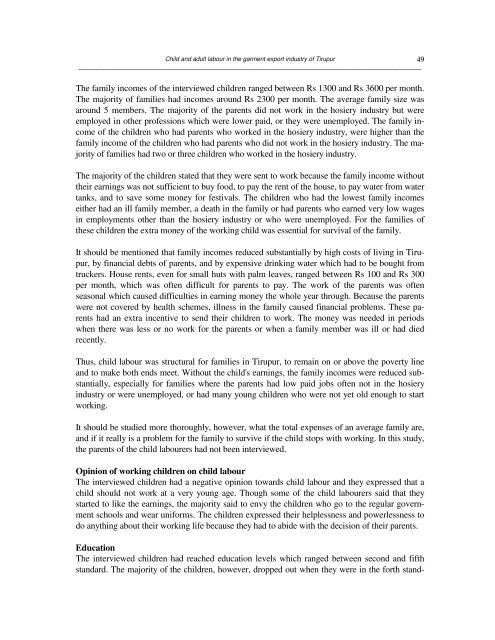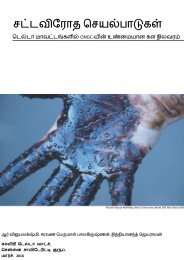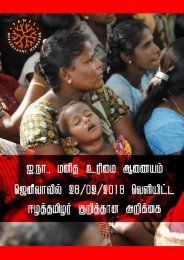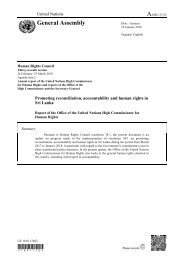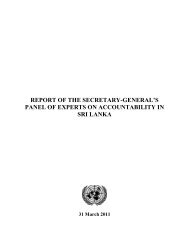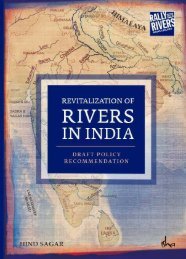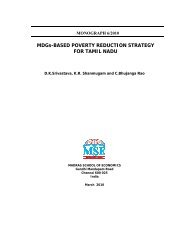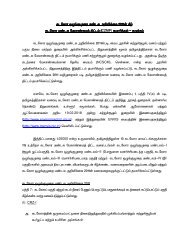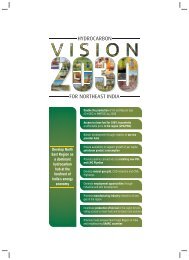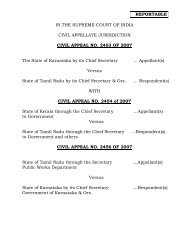Create successful ePaper yourself
Turn your PDF publications into a flip-book with our unique Google optimized e-Paper software.
<strong>Child</strong> <strong>and</strong> <strong>adult</strong> <strong>labour</strong> <strong>in</strong> <strong>the</strong> <strong>garment</strong> <strong>export</strong> <strong>in</strong>dustry <strong>of</strong> Tirupur<br />
──────────────────────────────────────────────────────────────────────────────────────────────<br />
The family <strong>in</strong>comes <strong>of</strong> <strong>the</strong> <strong>in</strong>terviewed children ranged between Rs 1300 <strong>and</strong> Rs 3600 per month.<br />
The majority <strong>of</strong> families had <strong>in</strong>comes around Rs 2300 per month. The average family size was<br />
around 5 members. The majority <strong>of</strong> <strong>the</strong> parents did not work <strong>in</strong> <strong>the</strong> hosiery <strong>in</strong>dustry but were<br />
employed <strong>in</strong> o<strong>the</strong>r pr<strong>of</strong>essions which were lower paid, or <strong>the</strong>y were unemployed. The family <strong>in</strong>come<br />
<strong>of</strong> <strong>the</strong> children who had parents who worked <strong>in</strong> <strong>the</strong> hosiery <strong>in</strong>dustry, were higher than <strong>the</strong><br />
family <strong>in</strong>come <strong>of</strong> <strong>the</strong> children who had parents who did not work <strong>in</strong> <strong>the</strong> hosiery <strong>in</strong>dustry. The majority<br />
<strong>of</strong> families had two or three children who worked <strong>in</strong> <strong>the</strong> hosiery <strong>in</strong>dustry.<br />
The majority <strong>of</strong> <strong>the</strong> children stated that <strong>the</strong>y were sent to work because <strong>the</strong> family <strong>in</strong>come without<br />
<strong>the</strong>ir earn<strong>in</strong>gs was not sufficient to buy food, to pay <strong>the</strong> rent <strong>of</strong> <strong>the</strong> house, to pay water from water<br />
tanks, <strong>and</strong> to save some money for festivals. The children who had <strong>the</strong> lowest family <strong>in</strong>comes<br />
ei<strong>the</strong>r had an ill family member, a death <strong>in</strong> <strong>the</strong> family or had parents who earned very low wages<br />
<strong>in</strong> employments o<strong>the</strong>r than <strong>the</strong> hosiery <strong>in</strong>dustry or who were unemployed. For <strong>the</strong> families <strong>of</strong><br />
<strong>the</strong>se children <strong>the</strong> extra money <strong>of</strong> <strong>the</strong> work<strong>in</strong>g child was essential for survival <strong>of</strong> <strong>the</strong> family.<br />
It should be mentioned that family <strong>in</strong>comes reduced substantially by high costs <strong>of</strong> liv<strong>in</strong>g <strong>in</strong> Tirupur,<br />
by f<strong>in</strong>ancial debts <strong>of</strong> parents, <strong>and</strong> by expensive dr<strong>in</strong>k<strong>in</strong>g water which had to be bought from<br />
truckers. House rents, even for small huts with palm leaves, ranged between Rs 100 <strong>and</strong> Rs 300<br />
per month, which was <strong>of</strong>ten difficult for parents to pay. The work <strong>of</strong> <strong>the</strong> parents was <strong>of</strong>ten<br />
seasonal which caused difficulties <strong>in</strong> earn<strong>in</strong>g money <strong>the</strong> whole year through. Because <strong>the</strong> parents<br />
were not covered by health schemes, illness <strong>in</strong> <strong>the</strong> family caused f<strong>in</strong>ancial problems. These parents<br />
had an extra <strong>in</strong>centive to send <strong>the</strong>ir children to work. The money was needed <strong>in</strong> periods<br />
when <strong>the</strong>re was less or no work for <strong>the</strong> parents or when a family member was ill or had died<br />
recently.<br />
Thus, child <strong>labour</strong> was structural for families <strong>in</strong> Tirupur, to rema<strong>in</strong> on or above <strong>the</strong> poverty l<strong>in</strong>e<br />
<strong>and</strong> to make both ends meet. Without <strong>the</strong> child's earn<strong>in</strong>gs, <strong>the</strong> family <strong>in</strong>comes were reduced substantially,<br />
especially for families where <strong>the</strong> parents had low paid jobs <strong>of</strong>ten not <strong>in</strong> <strong>the</strong> hosiery<br />
<strong>in</strong>dustry or were unemployed, or had many young children who were not yet old enough to start<br />
work<strong>in</strong>g.<br />
It should be studied more thoroughly, however, what <strong>the</strong> total expenses <strong>of</strong> an average family are,<br />
<strong>and</strong> if it really is a problem for <strong>the</strong> family to survive if <strong>the</strong> child stops with work<strong>in</strong>g. In this study,<br />
<strong>the</strong> parents <strong>of</strong> <strong>the</strong> child <strong>labour</strong>ers had not been <strong>in</strong>terviewed.<br />
Op<strong>in</strong>ion <strong>of</strong> work<strong>in</strong>g children on child <strong>labour</strong><br />
The <strong>in</strong>terviewed children had a negative op<strong>in</strong>ion towards child <strong>labour</strong> <strong>and</strong> <strong>the</strong>y expressed that a<br />
child should not work at a very young age. Though some <strong>of</strong> <strong>the</strong> child <strong>labour</strong>ers said that <strong>the</strong>y<br />
started to like <strong>the</strong> earn<strong>in</strong>gs, <strong>the</strong> majority said to envy <strong>the</strong> children who go to <strong>the</strong> regular government<br />
schools <strong>and</strong> wear uniforms. The children expressed <strong>the</strong>ir helplessness <strong>and</strong> powerlessness to<br />
do anyth<strong>in</strong>g about <strong>the</strong>ir work<strong>in</strong>g life because <strong>the</strong>y had to abide with <strong>the</strong> decision <strong>of</strong> <strong>the</strong>ir parents.<br />
Education<br />
The <strong>in</strong>terviewed children had reached education levels which ranged between second <strong>and</strong> fifth<br />
st<strong>and</strong>ard. The majority <strong>of</strong> <strong>the</strong> children, however, dropped out when <strong>the</strong>y were <strong>in</strong> <strong>the</strong> forth st<strong>and</strong>-<br />
49


